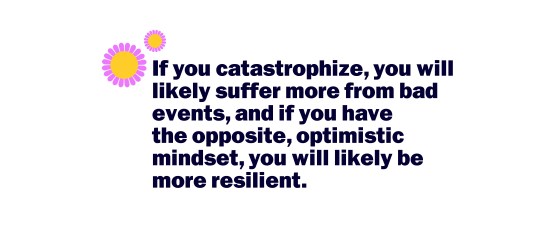When something really bad happens to you, how do you think about your future? Catastrophizers think, Everything will now unravel, and my life will be ruined. This mindset turns out to be an enormous impediment to happiness and, even worse, it is a major risk factor for posttraumatic stress disorder (PTSD).
We found this out by tracking every single one of the 79,438 U.S. Army soldiers who deployed to Iraq or Afghanistan from 2009 to 2013. On their very first day in the Army, they took a psychological questionnaire asking them to rate how they felt about several statements related to pessimism and its most extreme form, catastrophization. For example:
[time-brightcove not-tgx=”true”]
- “When bad things happen to me, I expect more bad things to happen”
- “When bad things happen to me, I blame myself for them”
- “I have no control over the things that happen to me”
- “When bad things happen to me, I cannot stop thinking about how much worse things will get”
- “When I have a physical problem, I am likely to think that it is something very serious”
- “When I fail at something, I give up all hope”
- “I respond to stress by making things worse than they are.”
It turns out that we could have used the day-one questionnaire to predict robustly who would develop PTSD. Catastrophizers who faced severe combat stress were almost four times as likely as noncatastrophizers to get PTSD over the course of their service. But even those catastrophizers who faced minimal combat were at greater risk for PTSD than noncatastrophizers, and at all other levels of combat as well.

Combat is near the extreme of the bad events that human beings face. So what is the lesson for the rest of us, the civilian population? If you catastrophize, you will likely suffer more from bad events, and if you have the opposite, optimistic mindset, you will likely be more resilient.
I confess that I am a catastrophizer, but I take my own medicine. I have learned how to combat catastrophization, and you can too. In our upcoming book Tomorrowmind, Gabriella Rosen Kellerman and I discuss how you can build this strength. One potent exercise is “putting it in perspective”: you begin by imagining a troubling event which has an uncertain, but potentially terrible, explanation. For soldiers, the example was a man missing at night. They start with the worst possible explanation: “He’s dead, and it’s all my fault.” Then, the best possible: “His radio battery died, and he will show up in a few minutes.” Finally, the most likely, along with plans to cope with it: “He’s probably injured, so we need to retrace our steps, find him, and bring him back.” Following this pattern built resilience in soldiers.
When COVID-19 broke out as I neared my 78th birthday, I catastrophized: “I’m in the most vulnerable group. I am sure to die.” But then I asked myself about the best outcome: “I am very healthy and will likely escape altogether.” And then I focused on the most likely outcome, and I planned for it: “I will isolate for now as best I can, take all the vaccines, and escape with a mild case, if that.” There is no way to completely eliminate uncertainty from your life. But this exercise is one way to systematically reduce catastrophization—and, therefore, both maintain happiness despite uncertainty and develop emotional resilience.
Seligman, PhD, is a professor at the University of Pennsylvania, director of the Positive Psychology Center, and former president of the American Psychological Association. He is the co-author, with Dr. Gabriella Rosen Kellerman, of Tomorrowmind.

Post A Comment:
0 comments: